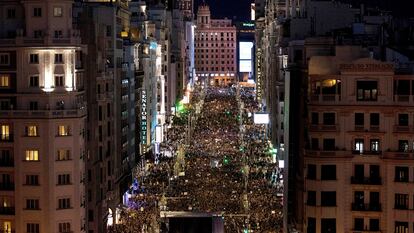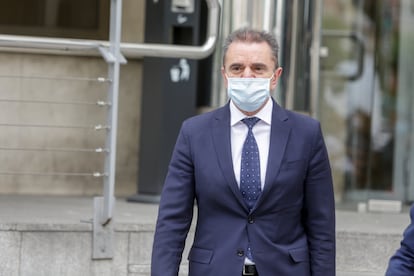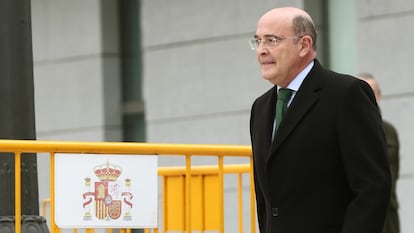Spanish judge shelves case tying Women’s Day march to spread of Covid-19
The political right had made much of the government’s alleged role in allowing public gatherings on March 8, when the coronavirus epidemic began to be apparent

A Madrid judge announced on Friday that she is shelving the case against the central government’s delegate in the Madrid region, José Manuel Franco of the Socialist Party (PSOE), for authorizing mass events in early March that may have helped spread the coronavirus.
These events included the Women’s Day march of March 8, known in Spain as 8-M, as well as a political rally held by the far-right party Vox that drew 9,000 people, and a soccer match at Wanda Metropolitano stadium attended by over 60,000 fans. The central government authorized these events just a few days before it decreed a state of alarm and introduced a national lockdown to fight the Covid-19 epidemic. The probe focused on whether José Manuel Franco had “enough information to have banned the demonstrations for health reasons,” according to a court order.
In a 52-page court document released Friday, Judge Carmen Rodríguez-Medel concluded that there was “not sufficient evidence of criminal action in the activities attributed to Franco.” According to the judge, the government delegate “did not have definite, objective and expert knowledge of the health risk [posed by the coronavirus] to the people involved in the demonstrations and gatherings.”

The judge also found that Franco “did not receive communication or health instructions” regarding Covid-19, and that “no personal or legal, public or private entity insisted that he should ban or restrict” the public gatherings. Indeed, when Franco was being investigated, he told the court: “There was no element at that moment that could lead me to ban a fundamental right like the right to protest.” Judge Rodríguez-Medel also stated that, based on forensic reports, “a cause-and-effect relationship” could not be established between the large events and the spread of the coronavirus.
When Rodríguez-Medel opened the case on March 23, she herself recognized the difficulty of deciding whether Franco was “deserving of criminal charges” given the “absolutely exceptional nature of the facts.” But the judge decided to persevere with the probe. During the nearly three-month investigation, more than 3,000 pages of documents were accumulated, around 20 witnesses were called to testify, and huge amounts of documentation were requested from the Madrid local and regional governments, the central Health Ministry, as well as the Health Ministry’s Coordination Center for Health Alerts.
The decision brings an end to a controversial investigation that has been dominating the political landscape in Spain for weeks. Right-wing political parties had said it would lead to an avalanche of legal action against the central government, which is a coalition led by PSOE with junior partners Unidas Podemos. But in the end, it was more of an anti-climax.
Sacking of a Civil Guard official
The probe into the central government’s delegate in Madrid made headlines at the end of May after the Interior Ministry suddenly sacked the head of the Civil Guard command in Madrid, Colonel Diego Pérez de los Cobos.
Interior Minister Fernando Grande-Marlaska said the decision was part of “a reasonable, normal policy of building a new team,” but a classified document leaked to the media showed that the dismissal was due to “not reporting on investigations,” which many linked to a damning Civil Guard report commissioned by Judge Rodríguez-Medel as part of her investigation.

This report, which was seen by EL PAÍS, analyzed 177 public gatherings in the Madrid region between March 5 and 14, and concluded that “from March 5, 2020 onwards there should not have been any demonstrations” due to the health crisis. It also criticized the fact that the Cabinet did not halt direct flights between Spain and Italy, which was by then already struggling with a coronavirus outbreak, until March 10.
According to sources familiar with its contents, the 83-page document also targeted Fernando Simón, the head of the country’s health emergencies coordination center and one of the most visible government officials during the Covid-19 crisis. The report claimed Simón had information about the gravity of the pandemic, yet did nothing to stop large public events that may have contributed to spreading the disease. But the document also omitted relevant information, got important dates mixed up, offered erroneous contagion figures, and made reference to numerous false news.
The internal memo from the Interior Ministry, signed May 24, said that Pérez de los Cobos was dismissed after he “lost the confidence” of his superiors for “not reporting on the progress of investigations and actions by the Civil Guard.” This sparked a fierce political row with opposition parties, who called for the minister’s resignation and accused the government of trying to interfere in the Civil Guard’s affairs.
The Civil Guard report also suggested that the central government’s delegation in Madrid had pressured 12 organizers to cancel their events due to health concerns, proving that the government already knew about the risk of coronavirus transmission. This claim was refuted by nine of the organizers who told this newspaper that this was not the case.
On this issue, Judge Rodríguez-Medel found there was no proof that the organizers and protesters had been pressured “not to exercise their fundamental right.”
English version by Melissa Kitson.
Tu suscripción se está usando en otro dispositivo
¿Quieres añadir otro usuario a tu suscripción?
Si continúas leyendo en este dispositivo, no se podrá leer en el otro.
FlechaTu suscripción se está usando en otro dispositivo y solo puedes acceder a EL PAÍS desde un dispositivo a la vez.
Si quieres compartir tu cuenta, cambia tu suscripción a la modalidad Premium, así podrás añadir otro usuario. Cada uno accederá con su propia cuenta de email, lo que os permitirá personalizar vuestra experiencia en EL PAÍS.
¿Tienes una suscripción de empresa? Accede aquí para contratar más cuentas.
En el caso de no saber quién está usando tu cuenta, te recomendamos cambiar tu contraseña aquí.
Si decides continuar compartiendo tu cuenta, este mensaje se mostrará en tu dispositivo y en el de la otra persona que está usando tu cuenta de forma indefinida, afectando a tu experiencia de lectura. Puedes consultar aquí los términos y condiciones de la suscripción digital.









































